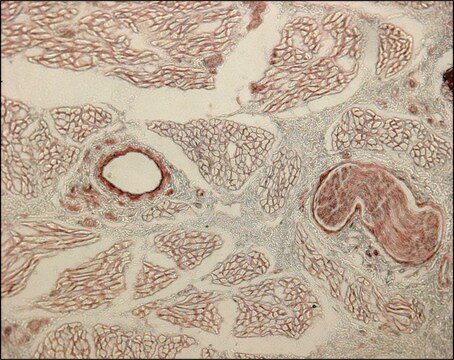D8281
Anti-Desmin antibody produced in rabbit

whole antiserum
Synonym(s):
Anti-Desmin, Desmin Detection Antibody, Rabbit Anti-Desmin
About This Item
Recommended Products
biological source
rabbit
Quality Level
conjugate
unconjugated
antibody form
whole antiserum
antibody product type
primary antibodies
clone
polyclonal
contains
15 mM sodium azide
species reactivity
chicken, bovine, human, mouse
enhanced validation
independent
Learn more about Antibody Enhanced Validation
technique(s)
indirect immunofluorescence: 1:20 using cultured cells
indirect immunofluorescence: 1:20 using human skeletal muscle sections
western blot: 1:100 using animal or human skeletal muscle.
UniProt accession no.
shipped in
dry ice
storage temp.
−20°C
target post-translational modification
unmodified
Gene Information
human ... DES(1674)
mouse ... Des(13346)
General description
Immunogen
Application
- immunohistochemistry of zebrafish intestines sections
- immunodetection in fish embryo samples
- immunolabeling of myofibers
Biochem/physiol Actions
Disclaimer
Not finding the right product?
Try our Product Selector Tool.
Storage Class Code
10 - Combustible liquids
WGK
nwg
Flash Point(F)
Not applicable
Flash Point(C)
Not applicable
Certificates of Analysis (COA)
Search for Certificates of Analysis (COA) by entering the products Lot/Batch Number. Lot and Batch Numbers can be found on a product’s label following the words ‘Lot’ or ‘Batch’.
Already Own This Product?
Find documentation for the products that you have recently purchased in the Document Library.
Customers Also Viewed
Our team of scientists has experience in all areas of research including Life Science, Material Science, Chemical Synthesis, Chromatography, Analytical and many others.
Contact Technical Service












